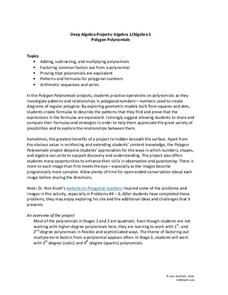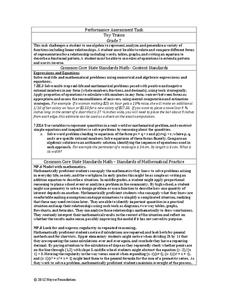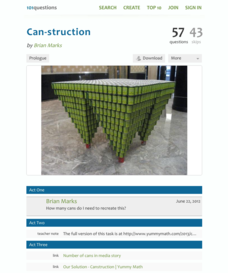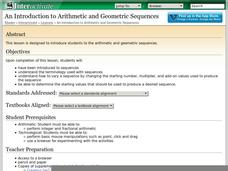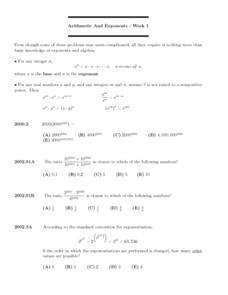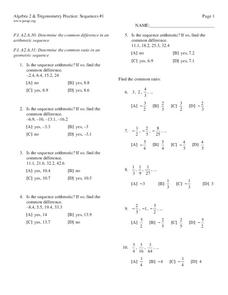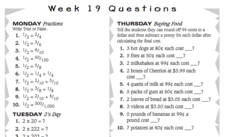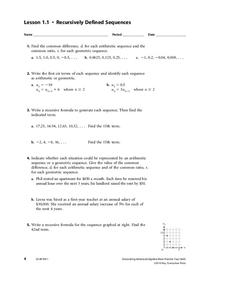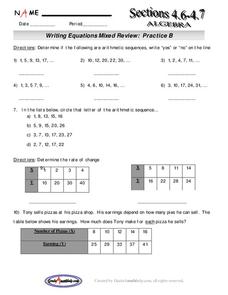5280 Math
Polygon Polynomials
Patterns in polygons lead to patterns in polynomials. Presented with a series of polygons, individuals create polynomial expressions to represent their patterns. The algebra project consists of nine problems that incorporate polynomial...
Noyce Foundation
Toy Trains
Scholars identify and continue the numerical pattern for the number of wheels on a train. Using the established pattern and its inverse, they determine whether a number of wheels is possible. Pupils finish by developing an algebraic...
Curated OER
Sequences
In this sequences learning exercise, 6th graders solve and complete 3 different types of problems. First, they complete the missing numbers and determine the term-to-term rule. Then, students find the nth term of each sequence and draw...
Curated OER
Introduction to Arithmetic and Geometric Sequences
Students examine the concept of sequences. Students create a sequence using varied starting numbers, multipliers, and add on values. Students practice determining the starting values to use in order to produce a desired sequence.
Pennsylvania Department of Education
Extending Pattern Understandings
Students use shapes and manipulatives to demonstrate patterns. In this patterns lesson plan, students also break up patterns to identify a pattern unit.
Curated OER
Finding Patterns in Fractals
Students discover patterns and sequences. They use a website to explore patterns and fractals. Students share their discovery of fractals and their patterns with the class. They develop a list of patterns used in everyday life.
Curated OER
Pattern Blocks to Understand Fractions
Students use pattern blocks to help them complete fraction problems. In this fraction lesson plan, students complete problems on worksheets provided.
Curated OER
Algebraic Processes And Its Connections To Geometry
Youngsters explore number patterns within a Hundreds Chart. They discover six specific patterns from six teacher-directed rules in cooperative groups and describe in words ONE of the three patterns in their Learning Logs. They prove for...
101 Questions
Can-struction
Can you solve it?! A New York City art challenge involves making sculptures from cans. The task is to determine the number of cans used in the engineering award-winning sculpture. Scholars consider the patterns in the different layers to...
Bowland
Patchwork Cushions
Find out if there are enough squares. Given diagrams for the first four figures in a sequence, pupils try to determine the next figure. Individuals find the number of square and triangle pieces of fabric that are required to make...
101 Questions
Toothpicks
Analyze patterns and build functions. Young scholars work on their modeling skills with an inquiry-based lesson. After watching a video presentation of the problem, they write functions and make predictions.
Shodor Education Foundation
An Introduction to Arithmetic and Geometric Sequences
Help your class look for patterns as they create their own arithmetic and geometric sequences. Engage learners with an introductory discussion on sequences and use the applet to let them explore how sequences are formed. Teachers might...
Curated OER
Arithmetic and Exponents - Week 1
In this exponent worksheet, learners add numbers written in exponential notation. They identify the base and the exponent. This two-page worksheet contains examples, definitions, and nine problems to solve.
Curated OER
Arithmetic and Geometric Means
In this algebra worksheet, students analyze the pattern and come up with the geometric means formula in the sequence. The complete the sequence with before and after numbers in the sequence to make it complete. There are 28 questions...
Curated OER
Finding The Sum of an Infinite Series
Students examine finding the sum of an infinite series as the limit of partial sums. Through hands-on activities, students create their own sequence by finding the area of a square and then cutting it in half-sized pieces. They write...
Curated OER
Sequences
In this algebra worksheet, students identify difference and common ratio in sequences. They use arithmetic and geometric ratios to solve patterns. There are 10 questions with an answer key.
Curated OER
Geometric Sequences and Series
In this algebra worksheet, students solve sequences using the geometric mean for sequences and series. They have to find the next number in the pattern using the formula for geometric means. There are 23 problems to be solved.
Education World
The African American Population in US History
How has the African American population changed over the years? Learners use charts, statistical data, and maps to see how populations in African American communities have changed since the 1860s. Activity modifications are included to...
Scholastic
Week 19 Questions
Present your young mathematicians with a new challenge each day. Fractions on Monday, Tuesday is 2's Day, Wednesday is for squares, Thursday is 99 cents day, and by Friday it's time to deal with time. In addition, just for fun, there's a...
West Contra Costa Unified School District
Writing Exponential Functions Based on Data
Give your class a concrete example of exponential growth and decay using this hands-on activity. These Algebra II lessons allow for the exploration of exponential growth and decay models, as well as the discovery of the patterns of each....
Curated OER
Exam One Review
In this secondary mathematics worksheet, students solve problems that involve patterns, arithmetic and geometric sequences, geometric logic and reasoning, and changing bases. The three page worksheet contains fourteen problems. Answers...
Curated OER
Recursively Defined Sequesnces
In this algebra worksheet, students solve a pattern or sequence using geometric and arithmetic formulas. There are 21 questions on 5 different sections.
Curated OER
Writing Equations Mixed Review
Learners write equations based on a pattern. In this algebra lesson, students calculate the arithmetic and geometric mean of a sequence. They rewrite word problems as a linear equation and solve real life scenario based on the given data.
Curated OER
The Why and How of General Terms
Sixth graders find the recurrence relation for simple sequences
construct tables of values for a pattern. They find the value of the general term of a sequence algebraically.


